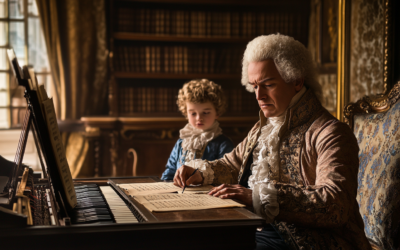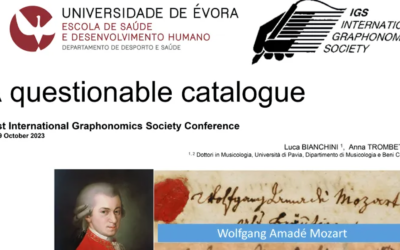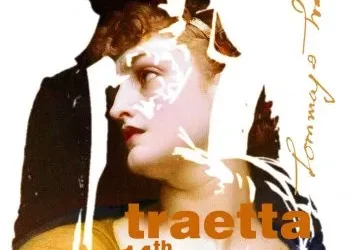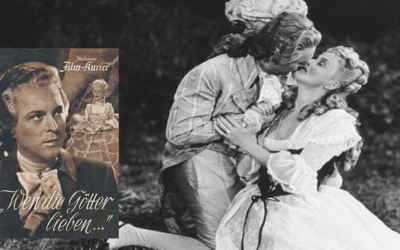Wolfgang Amadé Mozart
Unveiling the Truth: Mozart in Paris
Unveiling the often-overlooked reality of Mozart’s time in Paris reveals a story of manipulation and deception, far removed from the glorified narratives crafted by his father, Leopold.
Mozart in Italy: The Untold Story
Was Mozart truly a solitary genius, or was he merely the instrument of his father’s ambition? “Mozart in Italy” challenges the conventional narrative, revealing a complex dynamic between father and son that shaped the course of music history. Prepare to question everything you thought you knew.
“Leopold’s relentless self-promotion was not mere parental pride but a deliberate act to create a legacy for his son that would endure through the ages”
Mozart in Italy
The narrative of Wolfgang Amadeus Mozart’s journey through Europe has been long enshrined in popular culture as one of extraordinary triumphs, particularly in the courts of Paris and Versailles. However, a closer examination of the facts reveals a different story, one shaped by manipulation, exaggeration, and a relentless pursuit of status by his father, Leopold Mozart.
The Grand Illusion of Versailles
Leopold Mozart, ever the ambitious and controlling figure, orchestrated the family’s extensive tour of Europe with the calculated aim of showcasing his children’s talents. Paris, with its glittering court at Versailles, was a prime target. Arriving in November 1763, Leopold had already secured the help of Friedrich Melchior Grimm, a well-connected figure in Parisian society, to arrange performances for his children, Wolfgang and Nannerl. Yet, these performances were far from the grand concerts that one might imagine today. Instead, they were modest exhibitions, heavily promoted through Grimm’s Correspondance Littéraire, where hyperbolic terms like “genius” and “miracle” were liberally applied, often with little basis in reality.
The Myth of Royal Favour
Leopold’s correspondence paints a picture of unparalleled success at the French court, with tales of Wolfgang and Nannerl receiving the warmest of welcomes from King Louis XV and his family. The truth, however, is far less glamorous. While the Mozarts did perform at Versailles, there is scant evidence to suggest that the royal family paid them much attention. For instance, the infamous story of Wolfgang being served by Queen Maria Leszczyńska at the New Year’s Eve banquet is likely a fabrication. Such narratives were carefully crafted by Leopold to enhance his children’s reputations and secure their future prospects.
Deceptive Practices and False Accolades
One of the most striking examples of Leopold’s manipulations is the poem allegedly dedicated to his children by a French poet in 1764. In reality, this poem was a clumsy forgery. Leopold had taken a pre-existing work by the poet Barnabé Farmian Durosoy, removed the names of the original French musicians, and replaced them with his children’s names. This poem, presented as a genuine tribute to Wolfgang and Nannerl, was nothing more than a piece of Leopold’s marketing strategy, aimed at solidifying their status in the eyes of the European elite.
The Legacy of Deception
Leopold Mozart’s relentless self-promotion and fabrication of events were not mere parental pride; they were deliberate acts designed to create a legacy for his son that would endure through the ages. However, these embellishments have led to a distorted view of Mozart’s early career, overshadowing the less flattering aspects of his and his father’s personalities. The Mozarts’ time in Paris, often seen as a period of triumph, was in many ways a testament to Leopold’s skill in spinning reality to suit his ambitions.
You May Also Like
K.143: A Recitative and Aria in the Shadows of Doubt
K.143 is a prime example of how Mozart scholarship has turned uncertainty into myth. With no definitive evidence of authorship, date, or purpose, this uninspired recitative and aria in G major likely originated elsewhere. Is it time to admit this is not Mozart’s work at all?
The Enigma of Mozart’s Symphony K.73
The Symphony in C Major K.73 has long puzzled Mozart scholars. Touted as a youthful work of prodigious talent, its origins are murky at best. The title “Symphony,” inscribed on the first page of the autograph, is devoid of the composer’s name, casting immediate doubt on its attribution to Wolfgang Amadeus Mozart. Was this truly his work, or is the Symphony yet another victim of overzealous attribution?
Mozart’s Thematic Catalogue Exposed as a Forgery
A groundbreaking forensic analysis reveals that Mozart’s thematic catalogue, long thought to be his own work, is a posthumous forgery. This discovery, detailed in Mozart: The Construction of a Genius, turns centuries of Mozart scholarship on its head, demanding a re-examination of his legacy.
Bologna Connections
Quirino Gasparini’s rediscovered Mitridate aria takes centre stage in Bern and Basel, shedding light on Mozart’s reliance on this forgotten composer.
International Traetta Award
We are thrilled to announce that the 14th International Traetta Award has been bestowed upon Anna Trombetta and Luca Bianchini. This prestigious recognition honours their outstanding dedication to musicological research on primary sources of the European musical repertoire, offering significant contributions to reshaping the historiography of 18th-century music.
A Legacy Rewritten by the Shadows of History
Mozart’s image, often regarded as a universal symbol of musical genius, was heavily manipulated by the Nazi regime, a fact largely ignored in post-war efforts to “denazify” German culture. From propaganda-driven films to anti-Semitic narratives, Mozart’s legacy is far more complex and troubling than we are often led to believe.







